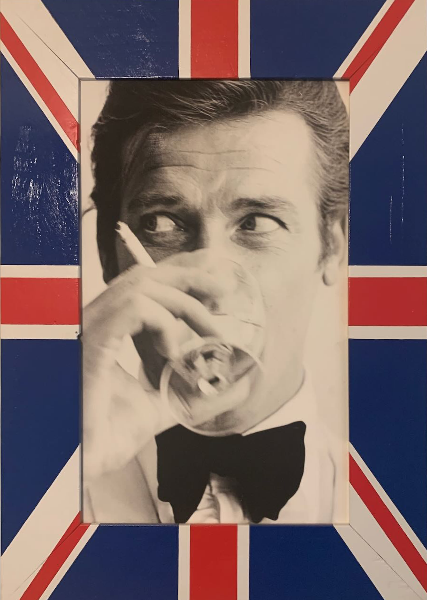The photo above is of actor Roger Moore. He is most associated with his time playing James Bond in seven movies during the 70’s and early 80’s. Unlike the current grittier action iteration of Bond, Moore’s movies were less serious, punctuated with the corny one-liners parodied in the Austin Powers series.
When he passed away in 2017, the following story made the rounds online*.
As a seven year old in about 1983, in the days before First Class Lounges at airports, I was with my grandad in Nice Airport and saw Roger Moore sitting at the departure gate, reading a paper. I told my granddad I’d just seen James Bond and asked if we could go over so I could get his autograph. My grandad had no idea who James Bond or Roger Moore were, so we walked over and he popped me in front of Roger Moore, with the words “my grandson says you’re famous. Can you sign this?”
As charming as you’d expect, Roger asks my name and duly signs the back of my plane ticket, a fulsome note full of best wishes. I’m ecstatic, but as we head back to our seats, I glance down at the signature. It’s hard to decipher it but it definitely doesn’t say ‘James Bond’. My grandad looks at it, half figures out it says ‘Roger Moore’ - I have absolutely no idea who that is, and my hearts sinks. I tell my grandad he’s signed it wrong, that he’s put someone else’s name - so my grandad heads back to Roger Moore, holding the ticket which he’s only just signed.
I remember staying by our seats and my grandad saying “he says you’ve signed the wrong name. He says your name is James Bond.” Roger Moore’s face crinkled up with realisation and he beckoned me over. When I was by his knee, he leant over, looked from side to side, raised an eyebrow and in a hushed voice said to me, “I have to sign my name as ‘Roger Moore’ because otherwise…Blofeld might find out I was here.” He asked me not to tell anyone that I’d just seen James Bond, and he thanked me for keeping his secret. I went back to our seats, my nerves absolutely jangling with delight. My grandad asked me if he’d signed ‘James Bond.’ “No”, I said. “I’d got it wrong”.
I was working with James Bond now.
Many, many years later, I was working as a scriptwriter on a recording that involved UNICEF, and Roger Moore was doing a piece to camera as an ambassador. He was completely lovely and while the cameramen were setting up, I told him in passing the story of when I met him in Nice Airport. He was happy to hear it, and he had a chuckle and said “Well, I don’t remember but I’m glad you got to meet James Bond.” So that was lovely.
And then he did something so brilliant. After the filming, he walked past me in the corridor, heading out to his car - but as he got level, he paused, looked both ways, raised an eyebrow and in a hushed voice said, “Of course I remember our meeting in Nice. But I didn’t say anything in there, because those cameramen - any one of them could be working for Blofeld.”
I was as delighted at 30 as I had been at 7. What a man. What a tremendous man.
This is a great story. It struck me enough that I would mention it every time my wife and I passed a strip mall gallery where the picture above hung in the window. Whether out of thoughtfulness or attempting to escape hearing the story again, my wife purchased it for me, and it hangs on my office wall.
It’s on my wall because of this story. Because a well-known actor mustered 30 seconds of patience for a 7-year-old, and 30 seconds again over two decades later. And that boy posted it online, and it traveled around the world to me.
Now, Roger may have done this hundreds of times with fans who undoubtedly approached him in public. Or maybe just that one time. Of maybe this story never actually happened.
It doesn’t really matter.
Because here we are, and I’m staring at the picture as I write this, smiling, thinking about that 30-year-old man skipping away from his second encounter with a legend, feeling like he’s seven again.
And you might retell this story tonight at the dinner table or out with friends. And it will live on.
So ask yourself, in your position of influence in your organization, how can you carefully craft an experience like this for your customers? What small amount of empathy can you inject into an interaction that could impact people so much they are compelled to talk about it incessantly?
The bar is set high for impact, but Roger shows us that the effort can be very small indeed.
*Marc Haynes originally posted the story in this Facebook post
